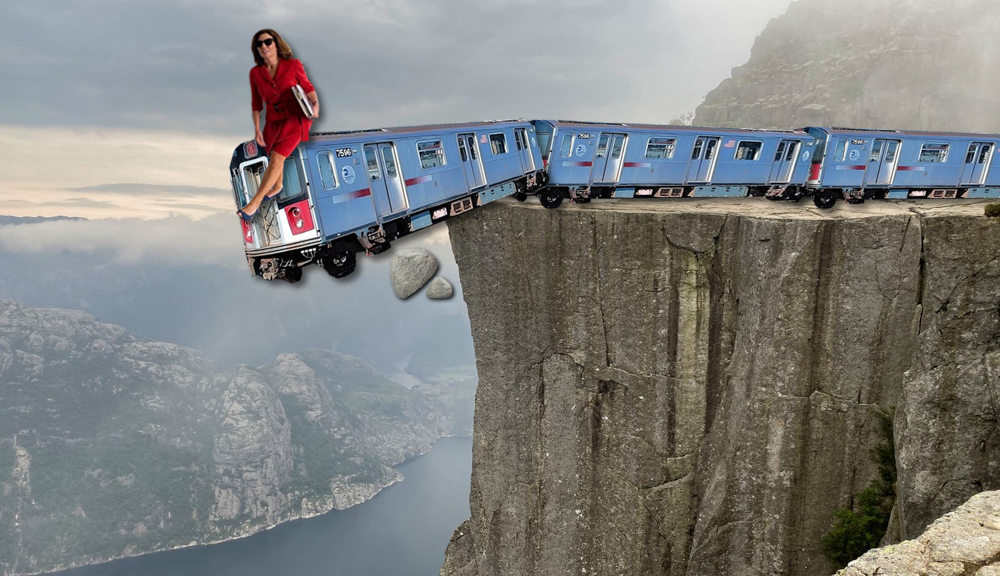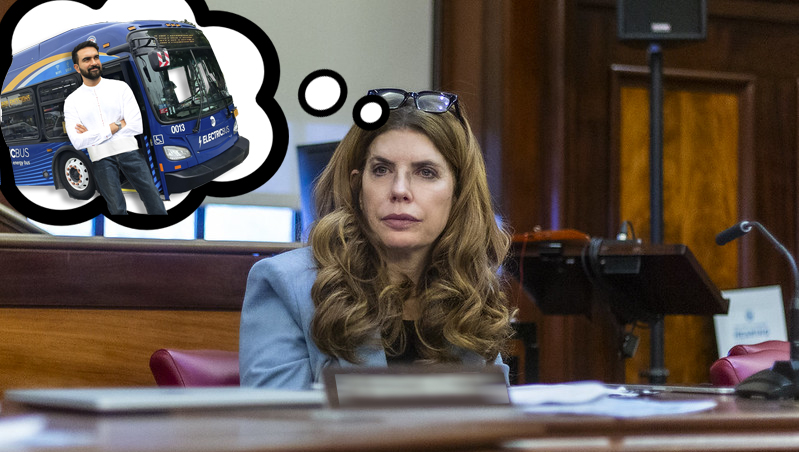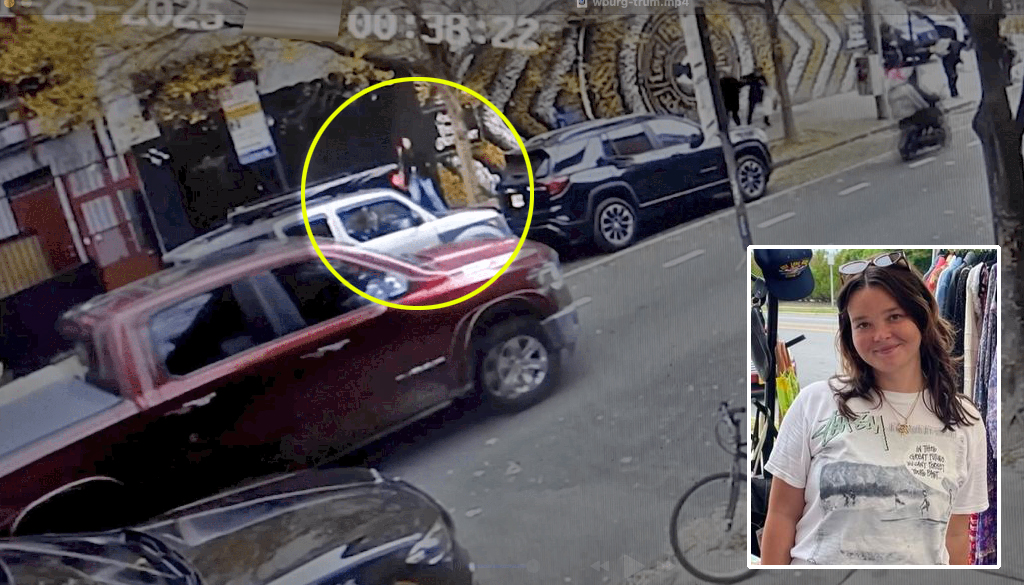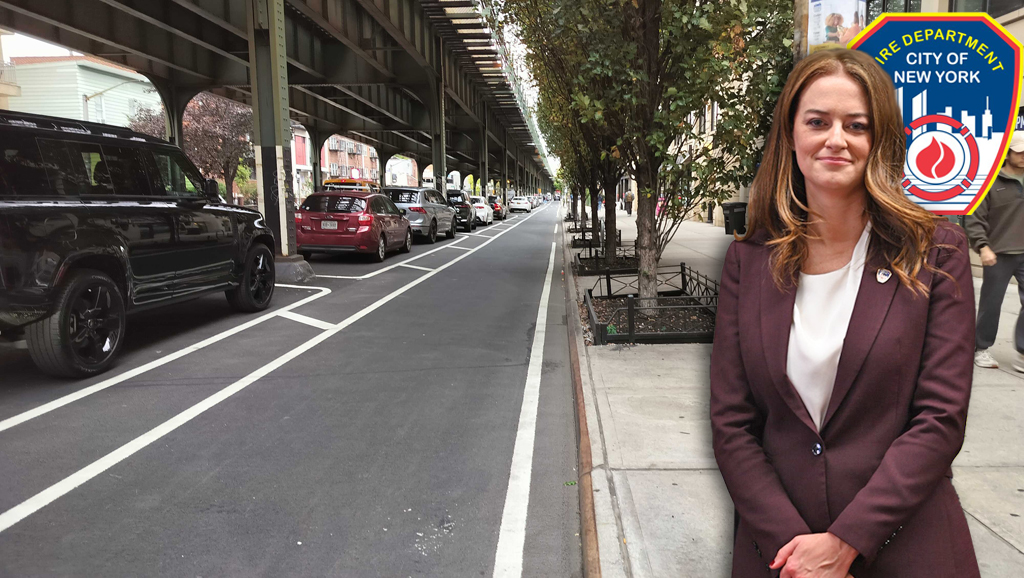Streetsblog is a non-profit newsroom devoted to covering the fight for livable cities. When we cover big, fast-moving stories like congestion pricing we kindly implore our readers to show some support to help fund our coverage. Click here if you can help. Thanks.
The editors
"Gridlock" Gov. Hochul's last-minute move to "indefinitely pause" congestion pricing has hit hard at MTA headquarters, deflating the hopes and dousing the energy of bureaucrats who thought she had their back after years of prep for the toll's now-canceled June 30 start date.
Current and former transit authority employees spoke to Streetsblog this week describing the stunning impact of Hochul's decision to throw their years of good work — not to mention hundreds of millions of dollars — in the trash after touting the tolls for years.
"The mood at the office yesterday was most akin to the day Trump was elected," one employee said Thursday, using the terms "dejected" and "confused."
"Shellshocked" was how another employee, who had worked on congestion pricing, described it, adding colleagues are still trying to understand the ramifications of the 11th-hour reversal that puts the Metropolitan Transportation Authority's stability on the line.
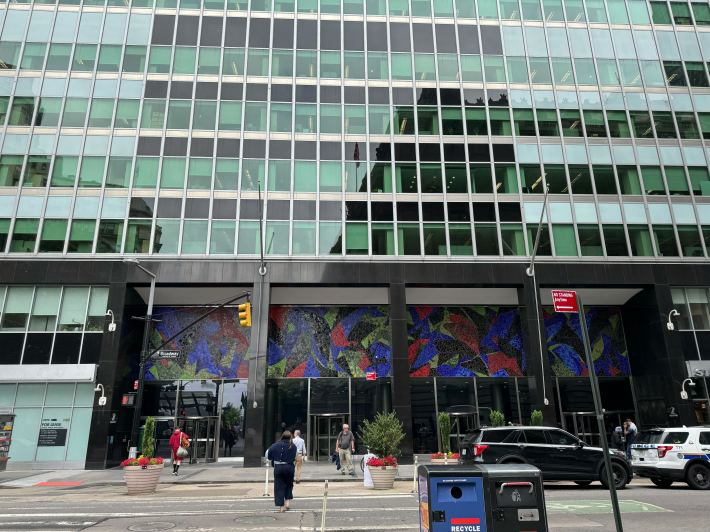
The governor, in a pre-taped video message announcing the move Wednesday, specifically called out MTA workers and advocates for their endless work of hosting contentious community meetings and writing a nearly 4,000-page environmental review.
"I want to say this. I recognize and am so grateful for the individuals from the MTA, the community, the advocates for their countless hours and hard work on this initiative. Thank you," the state's chief executive said.
But those words rang hollow to the workers at the MTA's Lower Manhattan headquarters this week.
“It’s fucked up what she’s doing to New Yorkers. She doesn’t care about the MTA," remarked the MTA employee.
"When something like this happens, it feels like a slap in the face," said another.
Transit officials had been counting on congestion pricing to fund $15 billion of the transportation authority's current $55-billion capital plan, which includes accessibility upgrades, essential maintenance and upgrades to the subway's aging signal system.
All of those were promised by MTA leaders, Hochul and her predecessor Andrew Cuomo as panaceas to transit system's systemic failures exposed during the 2017 "Summer of Hell."
“This is shocking. It’s already June," said one staffer outside the authority's 2 Broadway headquarters. "How can she do this so last minute? We’re already underfunded."
Hochul's flip-flop recalls then-Gov. Cuomo's early 2019 decision to cancel the L train shutdown, which MTA officials had similarly prepared for years. Then-New York City Transit President Andy Byford cited that decision a year later when he quit the agency in frustration with Cuomo's interference in his day-to-day management of the subways and buses.
But even during those whiplash-inducing times, the prior governor at least seemed to have a better grasp of the transit system's needs, said the staffer who worked on congestion pricing.
"Cuomo at least had some idea of what could happen instead, and it feels like in this case, the governor doesn’t really know enough about how the MTA works and what actually is required to fund the agency to really provide a better solution or alternative," the MTA employee said.
The headspinning meddling by politicians will make it harder to retain and recruit people to the MTA, said one former staffer.
"Of all the transportation agencies, it makes the MTA look more like there’s political involvement and things aren’t certain," the former agency worker said. "An MTA employee who I talked to today said, 'I don’t know if I want to be here, just to be rearranging the chairs on the Titanic.'"
Current MTA CEO Janno Lieber has been more deferential to political leadership than Byford. Hours after Hochul's shocking decision leaked in the media late Wednesday, Lieber, visibly shaken, spoke to employees in an effort to maintain morale, which Curbed first reported.
"Janno was clearly very upset, people in leadership are also upset about this and have tried really hard to ensure that morale isn’t cratering," an MTA employee told Streetsblog. "But it’s really hard when there are forces outside of your control, which you know going into the MTA, but doesn’t always become apparent until something like this happens."
Neither the MTA nor the governor's office are responding to queries from the media.
Hochul now needs to come up with money to replace the $15-billion hole in the capital plan — or force the MTA to scale back the plan, leaving key constituencies like subway riders, bus riders and the disability community in the lurch.
“We got blindsided. It’s obvious Gov. Hochul did this for political reasons and it’s a shame that she doesn’t keep her promise," one official said.
The transit staffer who worked on the tolling plan worried what this could mean for the city's aging transit system, which needs reliable revenue to make upgrades to its ancient signaling system, make most subway stations accessible for people with disabilities, and overall maintain the essential network in a state of good repair.
"It’s very dispiriting to think about what this means for the future of the city," the worker said. "It’s hard not to run through the worst case scenarios in your mind."
The transit staffer said Lieber's speech to employees this week gave some hope that their work remained meaningful.
"[Lieber was] emphasizing this is politics," the worker said. "Sometimes you work really hard for a thing and it doesn’t happen, but it still is worth it to work on the big thing and try to make the big thing happen."
